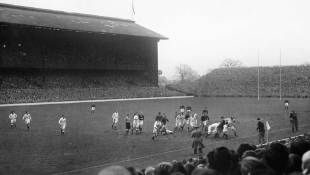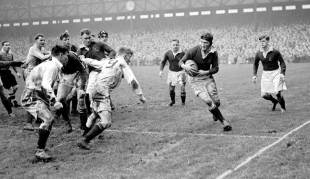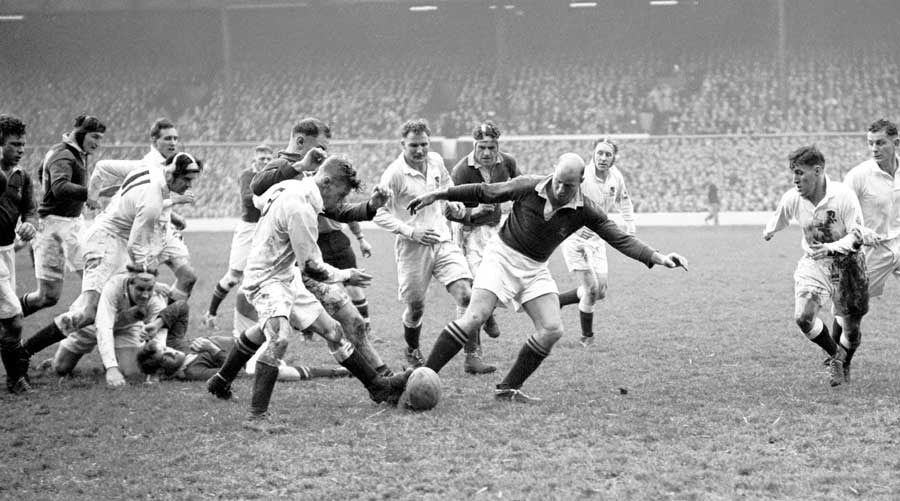|
England 3-8 South Africa, Twickenham
England's 'Great Struggle'
Richard Seeckts
January 5, 1952

A view of the match from Twickenham's West Stand
© PA Photos Enlarge
South Africa beat England to complete a clean sweep of the Home Nations on their most successful tour to date. The Times described it as "A Great Struggle" on "One of Twickenham's greatest days". The term 'Grand Slam' had not yet been coined, but this four month, 31 match Springbok tour also included wins over France and the Barbarians; 30 victories in all, with the only defeat by 11 points to 9 against London Counties early in the tour. South Africa were a well-honed touring unit who held all the aces; a powerful pack, experienced half-backs and pace at the rear. A 44-0 thrashing of Scotland had shown their ruthless streak. Ireland's characteristic forward muscle and mayhem kept them in the game until they ran out of puff, the Springboks winning 17-5 in Dublin. Only Wales had run them close, going down 6-3 to a Hannes Brewis drop goal. While England were not without hope, The Times felt they were "an unknown quantity as a team that, for all their inclusion of 11 former caps, the most one can hope from them is a hard, sturdy effort comparable with those put up by Ireland and Wales". England were warned not to feed Springbok full-back Johnny Buchler with high kicks that he would return with interest, and to beware the tactic of cross kicks to the wings, an innovative ploy at the time.

South Africa's class of 1952 © PA Photos
Enlarge
Nim Hall, England's captain, fly-half and master of the drop goal would be crucial in leading a fresh back line. Both wings, Ted Woodward and Chris Winn, and centre Albert Agar were making their international debuts and full-back William Hook playing his second match. (Coincidentally, those four are England's only players from the match still living.) Rain, frost and thaw left Twickenham's surface soft and slippery but that didn't prevent plenty of open play. South Africa always looked the faster, more cohesive unit but didn't make best use of the exceptional power of their scrummage. "Happily for them," The Times reported, "their veteran scrum-half, Du Toit, played what surely must have been one of the games of his life. It was Du Toit who scored his side's one try by a brilliant slip round the scrummage - an effort which caught the defence completely by surprise." Agar and Woodward had shown promise early on without threatening the try line. British Pathe highlighted Woodward's loss of his shorts in a tackle by his opposite number, Chum Ochse. "He's playing a ripping game", ran the saucy commentary. "Woodward showing plenty of form - yeah, plenty - he'll need a new pair of bags. There'll be a slight interval for him to adjust his dress", as players from both teams huddled around Woodward's embarrassment.

Ernst Dinkelmann makes a break for South Africa
© PA Photos
Enlarge
England's forwards showed tremendous fight against stronger, heavier opponents, denying the Springboks the anticipated advantage. They got among the opposing backs too, rolling over Buchler and nullifying his kicking game. Prop Bob Stirling's performance was singled out in the Times, together with Winn and Woodward who "proved the strong and willing players one had expected." 25 eventful minutes were scoreless until Du Toit's try, converted by Muller. Four minutes later Hook's penalty kick drifted wide to the left, Brewis fumbled and Winn, following up the kick, pounced to touch down. Hook's conversion attempt hit a post and went wide, making South Africa's lead 5-3 at half-time. In the second half, Ochse came close to scoring when diving over a tackler but failing to ground the ball. Agar, too, was crashed into the corner flag by Tjol Lategan as he dived for the line. Muller's penalty shot went in off the post for the game's final score. England's forwards tired towards the end under relentless Springbok pressure, but held out. South Africa were undeniably the better side. England, however, had made them fight harder than expected for the win and performed well in the 1952 Five Nations, beating Scotland, Ireland and France, and losing 8-6 to Wales. 
Basie van Wyk nudges the ball on for South Africa © PA Photos
Enlarge
© ESPN Sports Media Ltd
| |||||||||||||||
Live Sports
Communication error please reload the page.
-
Football
-
Cricket
-
Rugby
-
- Days
- Hrs
- Mins
- Secs
F1 - Abu Dhabi GP
Abu Dhabi Grand Prix December 11-131. Max Verstappen ()
2. Valtteri Bottas (Mercedes)
3. Lewis Hamilton (Mercedes)
4. Alexander Albon ()
5. Lando Norris ()
6. Carlos Sainz Jr ()
-
ESPNOtherLive >>
Snooker - China Open
Tennis - Miami Open

